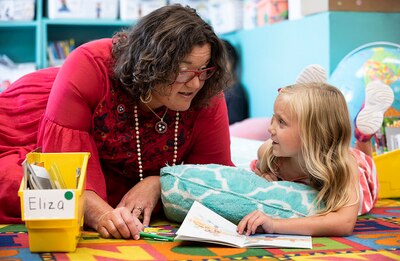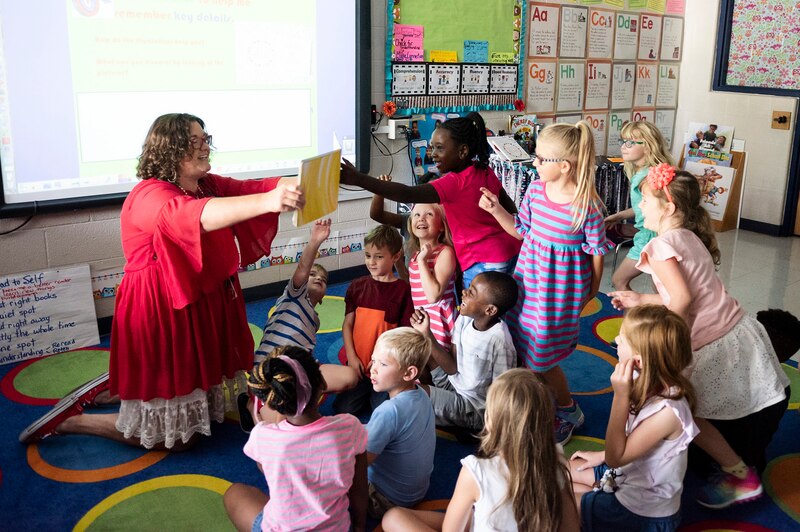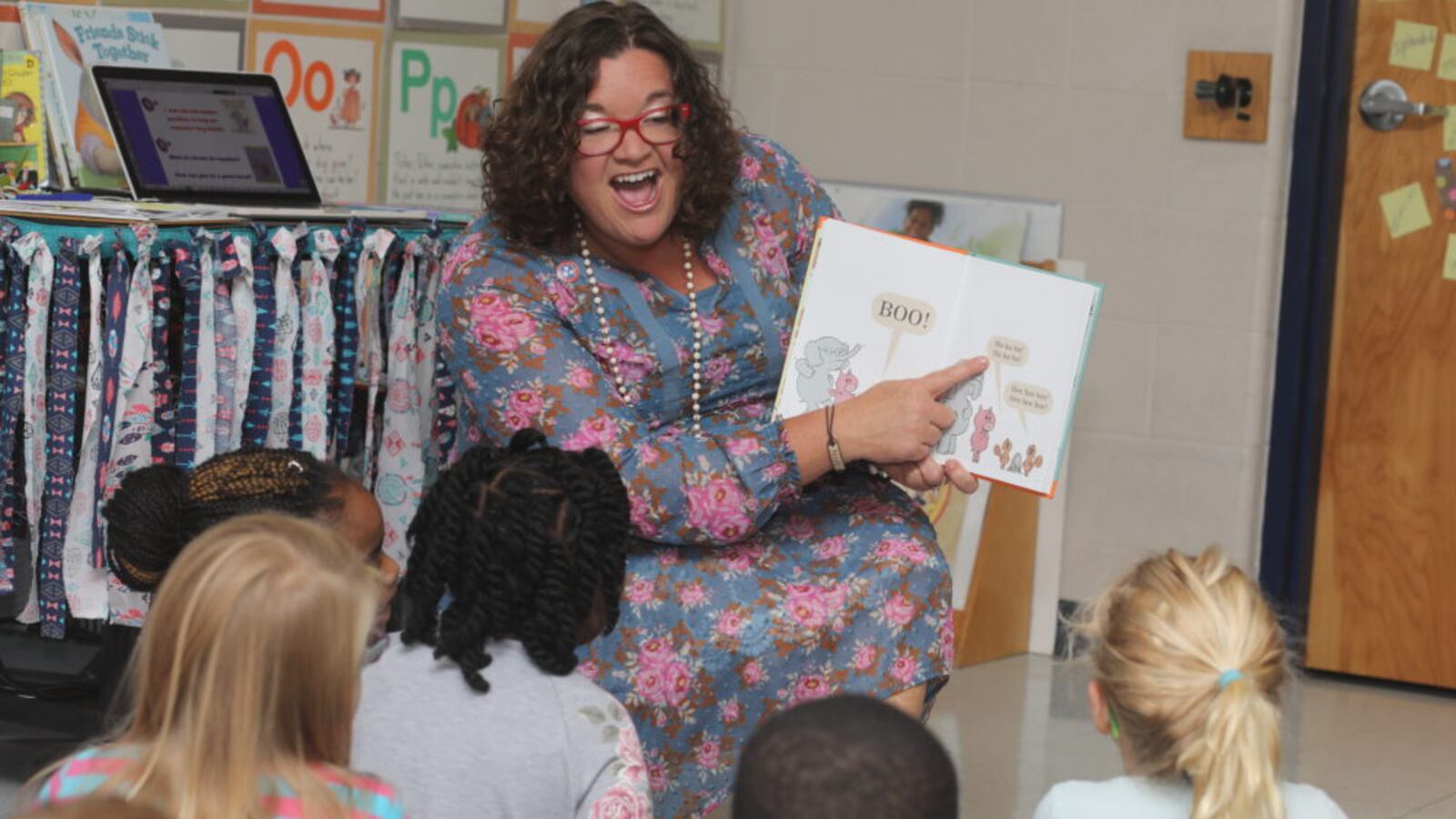Here, in a feature we call How I Teach, we ask educators who’ve been recognized for their work how they approach their jobs. You can see other pieces in the series here.
Melissa Miller loves to read, adores teaching first-graders, and has a fascination for penguins.
It’s no surprise, then, that an annual highlight for Tennessee’s Teacher of the Year is teaching a science unit she created to get her first-graders reading and learning about the unique aquatic bird.
“We have so much we can learn about and from penguins,” Miller explains. “They work together, share responsibilities, look out for each other, love each other for life, and persevere in the most challenging situations.”
The unit begins during the wintertime with reading that lets students learn penguin facts and categorize them by color and topic. Then in the spring, they do book reports on penguins — projects that “celebrate how far each child has come as a reader and writer.”
“The unit encompasses everything I believe about teaching and learning,” Miller says. “It puts me in the position as facilitator of learning. My desire is to fuel students’ passion for learning by teaching with passion.”
Now in her 20th year of teaching, Miller works at Franklin Elementary School in Franklin, south of Nashville. Her enthusiasm as a teacher and expertise in curriculum and technology are among the reasons that she was chosen Tennessee’s 2018-19 Teacher of the Year.
Miller talked with Chalkbeat about why teaching students to read is her greatest passion, how she partners with parents to build classroom rapport, and the upside of behavioral challenges.
This interview has been condensed and lightly edited.
Was there a moment when you decided to become a teacher?
I wanted to be a teacher beginning as a kindergarten student in Columbia, Tennessee. My teacher, Ms. Portia Lea, was so loving and encouraging, she just won me over. I have taken away a valuable lesson from each teacher that I had in my journey toward my career. I feel like they are part of who I am. I just want to give to my students the same experience of love, encouragement, hope, belief, and perseverance that I received.
Why elementary-age students? What’s the best thing about that age group?

My great passion is teaching kids to read! Reading opens the doors to their world and windows of possibilities for their future. I have taught kindergarten through fourth grade, but find myself best at home in first grade giving that strong foundation in reading. My first-graders are sponges for knowledge. Each child is as unique as a snowflake. They are just as loving and encouraging for me as I am for them.
How do you get to know your students?
At the beginning of the school year, I send home a questionnaire for parents to share their insights. During the first few weeks of school, we do community-building activities each day. I need to know what motivates each student, their favorite books, their family members, their pets, and what they want to be when they grow up. While reading books such as “Amazing Grace,” “The Important Book,” “Chrysanthemum,” “I Like Me,” and “Wilfred Gordon McDonald Partridge,” we learn many things about each other and truly become a family.
Tell us about a favorite lesson to teach. Where did the idea come from?
My favorite lessons to teach are within the Penguin Research Unit that I created. Students research what penguins eat, where they live, their characteristics, dangers, and adaptations. In the process, the students learn that their brains are like folders and that they need to organize information in order to remember it. They take in new facts and categorize them by color and topic. Then they write a book report complete with table of contents, headings, captions, diagrams, author information, and a glossary. Those reports are read and edited by a local author before we publish them for others in the school to read. Because this happens in the spring, it’s a time to celebrate how far each child has come as a reader and writer. The unit ties together fiction, nonfiction, writing, math, and science standards. Even at 6 and 7 years old, the kids are learning to research their wonderings and making connections on how to contribute to the world around them.
What object would you be helpless without during the school day?
A funny necessity is my Mr. Sketch Scented Markers in all sizes to create anchor charts. A serious necessity is the rich literature that I have collected through the years. I don’t collect things, I collect books. A fun date night for my husband and me is going to the bookstore for coffee and more books.
What was the biggest misconception that you initially brought to teaching?
One of the quick lessons I learned came when I started out by communicating with parents once per week about their child’s behavior. I quickly found out that weekly would not work. Parents need daily communication. They cannot address problems if I don’t communicate them right away. The best communication plan is the one that gets the most collaboration. It strengthens the partnership between teacher and parents.
What’s the best advice you’ve received about teaching?
“If you look cute and smell pretty, your kids will love you.” That came in the first week of my first year. Not only was this funny advice, it keeps things fun!
You serve as a team leader and mentor at your school. What advice do you give to new teachers?
Love your students! Each one is an individual with their own gifts and challenges. Get to know what motivates them, because each one is unique. Listen, really listen, to your students. Know the names of their siblings, favorite sports, favorite authors, and pets. Greet each student with a smile and a personal message. And make each day count!
Tell us about a memorable time — good or bad — when contact with a student’s family changed your perspective or approach.
Anytime I contact a parent about behavioral challenges, it changes my perspective and approach. This is where empathy and compassion come together. Understanding the child deep down gives me a snapshot into what motivates them and what does not. It guides me in making home-school connections ultimately to benefit both places. I need to understand where they are coming from in order to help them see the vision for where they can go.
What part of your job is most difficult?
I am constantly ON. My mind is on my kids at school as everything I do and everywhere I go ties back to teaching and learning experiences that I can share.
What are you reading for enjoyment?
“Love Does” by Bob Goff
Do you have a favorite quote you’d like to share with other educators?
“Positive people on positive teams produce positive results and the essential ingredient is positive energy.” —Jon Gordon from “The Energy Bus”



